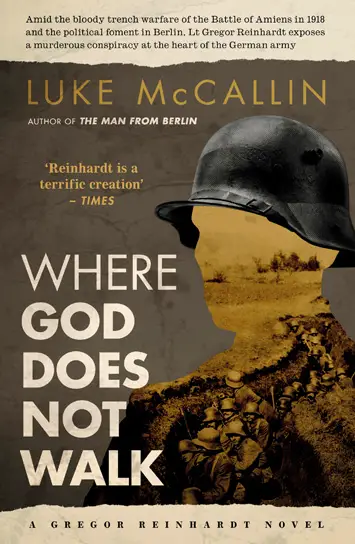Where God Does Not Walk by Luke McCallin – Review

By Nigel Armitage
Where God Does Not Walk is the fourth instalment of the popular Gregor Reinhardt series, but it is a prequel and so can be read as a standalone novel. The setting is the Western Front in July 1918 and the story is certainly not sparing of the grim reality for those who lived and died there. In fact, this book’s great strength lies in its unflinching rendering of a world characterised by savagery and inhumanity. The opening chapter plunges the reader straight into this world, of dank and bloodied cellars in bombed out farm buildings, and the sombre tone is unrelenting throughout.
Reinhardt is a young lieutenant, but already a veteran of punishing campaigns against the Russians, along with the small company of men under his command. When one of his men is accused of murdering a group of officers, Reinhardt is compelled to investigate the murky circumstances. As well as putting him at significant personal risk, his investigation will uncover the cynical and callous lengths to which others will go in the name of dogma and warped ideals. If war is hell, Reinhardt will awaken to the brutal and scandalous truth of how vested interest plays its part in perpetuating that hell.
These themes make for a difficult but compelling read. Despite Reinhardt’s youth, barely out of ‘pimply adolescence’, readers of the earlier books in the series will likely recognise the qualities that characterise the older Reinhardt: a dogged persistence to finding out the truth; a commitment to righting an injustice; a loyalty to his comrades-in-arms instead of a blind allegiance to duty and the Fatherland. His compulsion to act comes from “something deep down inside, a throbbing reminder that he was more than just what he owed himself.” At a time and place in history where lives were being cut short in multitudes, Reinhard’s actions re-affirm the significance of just one death and the importance of finding out how and why it happened.
“Redemption amidst the carnage”
 Reinhardt’s tenacity up against ‘the shadowed motivations and machinations’ of others creates an engrossing dramatic tension which never slackens. The book’s success lies in combining this tension with characters with psychological depth and interest, as when Reinhardt returns to Berlin on leave from the Front and reunites with his father. All too evident to both is how the experience of war has changed the younger man. Reinhardt is a man transformed but regrettably so, because, of course, it is a damaging and twisting experience rather than an enriching one.
Reinhardt’s tenacity up against ‘the shadowed motivations and machinations’ of others creates an engrossing dramatic tension which never slackens. The book’s success lies in combining this tension with characters with psychological depth and interest, as when Reinhardt returns to Berlin on leave from the Front and reunites with his father. All too evident to both is how the experience of war has changed the younger man. Reinhardt is a man transformed but regrettably so, because, of course, it is a damaging and twisting experience rather than an enriching one.
Also explored insightfully in the story is how medical opinion differed at the time in the treatment of those soldiers suffering from ‘shell shock’. Whereas one doctor advocates the value of a talk-based, sympathetic approach, another is all for shaming the unfortunate individual and inflicting further physical pain via rudimentary electronic shock treatment. That someone with responsibility for providing succour to the wounded should instead cause them further harm is just one example of many in this story of war’s cruel irony.
Where God Does Not Walk will undoubtedly appeal to fans of both detective and military fiction. Reinhardt’s investigation amidst the ‘fountaining heaves of earth’ and the ‘humming threat of metal’ combines readerly thrills and trepidation in equal measure. The book overall has such a strong feeling of authenticity, but the painstaking research evidently taken by the author never overshadows what is ultimately a story of human redemption amidst the carnage and chaos of war. A superb and hugely enjoyable read.
‘Where God Does Not Walk’ by Luke McCallin is published by No Exit Press, £18.99 hardback









